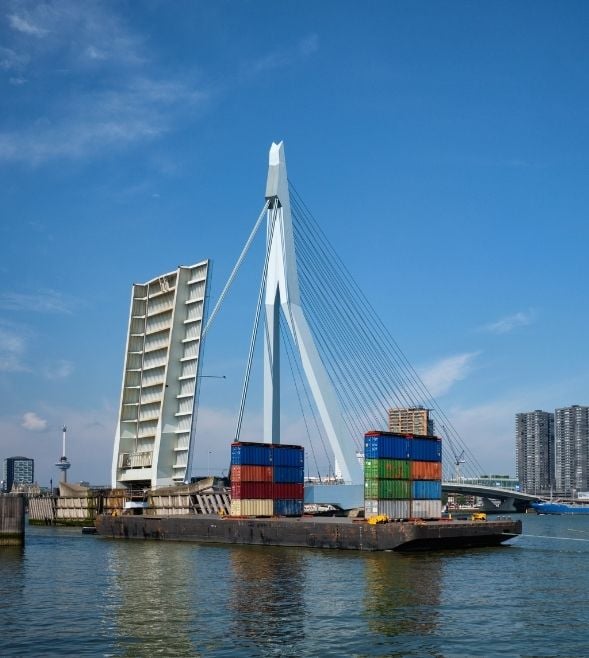-
Financial administration & outsourcing
Entrepreneurs who outsource financial administration reduce the number of administrative tasks and consequently have more time and space to focus on growth.
-
Financial insight
We help you turn financial data into valuable insights that support you in making well-founded decisions. In-depth analyses of your financial situation will help give you a better idea of where you stand and where the opportunities for growth lie, both in the short and long term.
-
Financial compliance
We make sure your company complies with financial legislation and regulations, with correct financial statements, tax reports and other obligations. From our global network, we support you in managing local and international tax risks.

-
Impact House by Grant Thornton
Building sustainability and social impact. That sounds good. But how do you go about it in the complex world of stakeholders, regulations and frameworks and changing demands from clients and society? How do you deal with important issues such as climate change and biodiversity loss?
-
Business risk services
Minimize risk, maximize predictability, and execution Good insights help you look further ahead and adapt faster. Whether you require outsourced or co-procured internal audit services and expertise to address a specific technology, cyber or regulatory challenge, we provide a turnkey and reliable solution.
-
Cyber risk services
What should I be doing first if my data has been kidnapped? Have I taken the right precautions for protecting my data or am I putting too much effort into just one of the risks? And how do I quickly detect intruders on my network? Good questions! We help you to answer these questions.
-
Deal advisory
What will the net proceeds be after the sale? How do I optimise the selling price of my business or the price of one of my business activities?
-
Forensic & integrity services
Do you require a fact finding investigation to help assess irregularities? Is it necessary to ascertain facts for litigation purposes?
-
Valuations
Independent and objective valuations tailored for mergers, acquisitions, and legal matters.

-
Auditing of annual accounts
You are answerable to others, such as shareholders and other stakeholders, with regard to your financial affairs. Financial information must therefore be reliable. What is more, you want to know how far you are progressing towards achieving your goals and what risks may apply.
-
IFRS services
Financial reporting in accordance with IFRS is a complex matter. Nowadays, an increasing number of international companies are becoming aware of the rules. But how do you apply them in practice?
-
ISAE & SOC Reporting
Our ISAE & SOC Reporting services provide independent and objective reports on the design, implementation and operational effectiveness of controls at service organizations.

-
International corporate tax
The Netherlands’ tax regime is highly dynamic. Rules and the administrative courts raise new challenges in fiscal considerations on a nearly daily basis, both nationally and internationally.
-
VAT advice
VAT is an exceptionally thorny issue, especially in major national and international activities. Filing cross-border returns, registering or making payments requires specialised knowledge. It is crucial to keep that knowledge up-to-date in order to respond to the dynamics of national and international legislation and regulation.
-
Customs
Importing/exporting goods to or from the European Union involves navigating complicated customs formalities. Failure to comply with these requirements usually results in delays. In addition, an excessively high rate of taxation or customs valuation for imports can cost you money.
-
Human Capital Services
Do your employees determine the success and growth of your organisation? And are you in need of specialists which you can ask your Human Resources (HR) related questions? Human Resources (HR) related questions? Our HR specialists will assist you in the areas of personnel and payroll administration, labour law and taxation relating to your personnel. We provide you with high-quality personnel and payroll administration, good HR guidance and the right (international) advice as standard. All this, of course, with a focus on the human dimension.
-
Innovation & grants
Anyone who runs their own business sets themselves apart from the rest. Anyone who dares stick their neck out distinguishes themselves even more. That can be rather lucrative.
-
Tax technology
Driven by tax technology, we help you with your (most important) tax risks. Identify and manage your risks and become in control!
-
Transfer pricing
The increased attention for transfer pricing places greater demands on the internal organisation and on reporting.
-
Sustainable tax
In this rapidly changing world, it is increasingly important to consider environmental impact (in accordance with ESG), instead of limiting considerations to financial incentives. Multinational companies should review and potentially reconsider their tax strategy due to the constantly evolving social standards
-
Pillar Two
On 1 January 2024 the European Union will introduce a new tax law named “Pillar Two”. These new regulations will be applicable to groups with a turnover of more than EUR 750 million.
-
Cryptocurrency and digital assets
In the past decade, the utilization of blockchain and its adoption of a distributed ledger have proven their capacity to revolutionize the financial sector, inspiring numerous initiatives from businesses and entrepreneurs.
-
Streamlined Global Compliance
Large corporations with a presence in multiple jurisdictions face a number of compliance challenges. Not least of these are the varied and complex reporting and compliance requirements imposed by different countries. To overcome these challenges, Grant Thornton provides a solution to streamline the global compliance process by centralizing the delivery approach.
-
Corporate Law
From the general terms and conditions to the legal strategy, these matters need to be watertight. This provides assurance, and therefore peace of mind and room for growth. We will be pro-active and pragmatic in thinking along with you. We always like to look ahead and go the extra mile.
-
Employment Law
What obligations do you have with an employee on sick leave? How do you go about a reorganisation? As an entrepreneur, you want clear answers and practical solutions to your employment law questions. At Grant Thornton, we are there for you with clear advice, from contracts and terms of employment to complex matters such as dismissal or reorganisation.
-
Sustainable legal
At Grant Thornton, we help companies integrate sustainability into their business operations, with sustainable legal at the heart of our approach. We advise on ESG (Environmental, Social, Governance) legislation, and help draft sustainable contracts, implement HR policies, and carry out ESG due diligence in M&A transactions (Mergers and Acquisitions).
-
Maritime sector
How can you continue to be a global leader? The Netherlands depends on innovation. It is our high-quality knowledge which leads the maritime sector to be of world class.


ViDA can be divided in the three main areas:
- Digital reporting (DRR) based on e-invoicing
- A single VAT registration: an extension of the OSS
- New VAT rules for platform economy and e-commerce
The most important ViDA changes are summarised below.
DRR based on e-invoicing
From early 2025: no derogation is required for domestic e-invoicing requirements
After adoption of the ViDA, EU Member States (MSs) are not required to ask for an agreement from the European Commission to implement e-invoicing requirements for domestic transactions (provided it applies only to established taxpayers). MSs should allow e-invoices that comply with the European standard on e-invoicing (EN 16931) adopted by the Commission Implementing Decision (EU) 2017/187055 and the Directive 2014/55/EU in the context of the B2G e-invoicing (the ‘European standard’).
MSs have the option to introduce mandatory e-invoicing for domestic B2B and B2C transactions (for established businesses) without the need for a derogation from the European Commission. This could leave businesses with minimal time to prepare.
From 1 July 2030: common DRR/e-invoicing for intra-EU transactions
There will be an obligation to:
- issue structured e-invoices including all required data in standard format within 10 days from a chargeable event; and
- transmit data from these invoices to the relevant national VAT authority’s electronic portal in real time.
This obligation will cover certain cross-border supplies and acquisitions of goods and services as well as supplies subject to the mandatory domestic reverse charge. While the supplier should report data of the sale when the e-invoice is issued or should be issued, the recipient of the invoice should report the transaction within 5 days.
The reverse charge would become mandatory from 1 July 2028 (see more details in Section 2 below under “Mandatory application of the reverse charge for B2B transactions by non-established suppliers”.
E-invoicing
The e-invoicing requirements will not only apply to all intra-EU supplies of goods and services but also for all cross-border and local supplies that are subject to the mandatory reverse charge.
Following additional data elements should be included on e-invoices:
- mandatory payment details and bank account numbers.
- in the case of an invoice that corrects the initial invoice, the corrected/initial invoice’s sequential number.
Summary invoices are allowed if issued no later than 10 days following the end of the calendar month to which this summary invoice refers.
Digital transaction-based reporting (DTBR)
The European Sales Lists (ESLs) will be abolished and replaced with DTBR.
The DTBR for intra-EU transactions will cover the same transactions that were covered by the ESLs with the exception of the call-off stocks which will cease to exist. In addition, supplies of goods and services subject to the mandatory reverse charge mechanism will also be included.
The data containing most of the mandatory VAT invoice details would need to be transmitted on a transaction-level basis in real time.
Reporting intra-Community acquisitions of goods and services
The person acquiring the goods and the recipient of the services should be required to report the e-invoice data on their intra-Community purchases of goods and services within 5 days. The purpose is to compare the data declared by the supplier with the data declared by the customer to detect VAT fraud.
The current VIES will be replaced by the Central VIES system
The Central VIES will be able to store data transmitted on cross-border operations, cross check information received on intra-EU supplies and acquisitions, aggregate data to make it available to national tax authorities by VAT registration number, and augment the data from the intra-EU transaction reports with other data sources like the customs surveillance system or the future Central Electronic System of Payment information (CESOP). In addition to its reporting uses, the Central VIES system would also contain taxpayer’s VAT registration data provided by the national tax authorities’ databases.
Harmonization of the domestic DRRs
From 1 July 2030, the domestic DRRs (if made use of) should comply with the harmonized EU system for DDR (e.g., real-time reporting of data on a transaction-by-transaction basis) and the possibility to transmit the data according to the European Standard should be provided.
MSs which already have domestic DRRs will have to adapt them to the features of the EU DDR system by 2035 at the latest.
A single VAT registration and other measures to reduce the compliance costs for business
This measure aims decreasing the need for multiple VAT registrations by expanding the OSS and domestic reverse charge.
Extension of OSS to all types of B2C supplies
The OSS scheme currently provides a business selling goods B2C in other MSs as well as a marketplace collecting VAT as the deemed supplier to fulfil their VAT compliance obligations via a single online portal. Several cross-border B2C services provided across the EU can also reported via the OSS.
From 1 January 2027, the scope of OSS is extended to cover supplies of electricity, gas and heat.
From 1 July 2028, the scope of OSS is extended to cover all B2C supplies of goods and provision of services.
The non-union OSS will cover all B2C supplies of services, and not only supplies of services to EU established customers.
The scope of the Union OSS scheme will be expanded to cover domestic B2C supplies of goods by businesses who are not registered for VAT in in the MS of consumption.
New special scheme for transfers of own goods
From 1 July 2028, stock transfers (i.e. movements of goods between EU MSs) could be reported in OSS. This means that businesses transferring stock between EU MSs could report those movement of own goods via OSS. The EU call-off stock simplification will become obsolete and will be phased out from 1 July 2028.
Mandatory application of the domestic reverse charge for B2B transactions by non-established suppliers
From 1 July 2028, the domestic reverse charge will apply for all B2B supplies of goods and services made by non-established businesses if the recipient of the goods or receiver of the services is registered for VAT in the MS in which the VAT is due.
The supplier need to report the reverse charged transactions in the ESL from 1 July 2028, and in the EU DRR (e-invoicing and transaction-based reporting), from 1 July 2030. The acquirer of the goods or services also needs to report the purchases in the EU DRR from 1 July 2030.
Updated VAT Rules for Platform Economy and E-Commerce
The proposed rules enhance the role of online marketplaces in the collection of VAT when they facilitate a supply of passenger transport or short-term accommodation.
Providing services of rental and passenger transport via platforms
From 1 January 2030 (optionally from 1 July 2028), a deemed supplier rule is introduced for platforms operating in passenger transport and short-term accommodation sectors. The platforms will be responsible for collecting and remitting VAT when their underlying suppliers will not charge VAT because they are, for example, individuals acting in their private capacity (non-entrepreneurs for VAT purposes) or exempted small businesses, for example, operating under the VAT registration threshold.
The proposed rules increase the administrative burden for certain platforms and the VAT burden for small businesses or individuals who operate via such platforms.
High-level timeline ViDA
- Early 2025: EU MSs may oblige businesses to issue e-invoices for domestic supplies. No approval of the European Commission for domestic e-invoicing required anymore.
- 1 January 2027: Updates in the e-commerce package; OSS extension to supplies of electricity, gas and heat.
- 1 July 2028: Single VAT registration (extension of the OSS to all B2C supplies, stock transfers and application of the mandatory reverse charge) and voluntary implementation of the deemed supplier rule to accommodation and mobility platforms.
- 1 January 2030: Extended VAT obligations for platforms: mandatory implementation of the deemed supplier rule to accommodation and mobility platforms.
- 1 July 2030: Mandatory Digital Reporting Requirements (DRR) based on e-invoicing for B2B intra-EU transactions and transactions subject to the mandatory reverse charge; harmonization of domestic e-invoicing (except these existing before 2024) with EU standards.
- 1 January 2035: Harmonization of pre-2024 existing domestic e-invoicing with EU standards.










